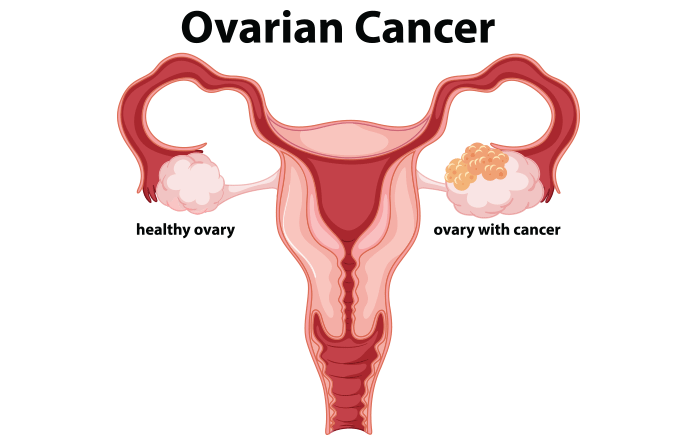
Everything You Should Know About Ovarian Cancer: Causes, Symptoms, Types And Treatment
- Anu
- May 8, 2021
- Health
- ovarian cancer awareness month, ovarian cancer causes symptoms types treatment
- 0 Comments

Ovarian cancer is a type of cancer that begins in the ovaries. The female reproductive system contains two ovaries, one on each side of the uterus. The ovaries — each about the size of an almond — produce eggs (ova) as well as the hormones estrogen and progesterone.
Ovarian cancer often goes undetected until it has spread within the pelvis and abdomen. At this late stage, ovarian cancer is more difficult to treat. Early-stage ovarian cancer, in which the disease is confined to the ovary, is more likely to be treated successfully.
It is the fifth most common cause of cancer-related death among females in the United States, the second most common and the deadliest gynecological malignancy in Nigeria.
May 8 annually is celebrated as World Ovarian Cancer day dedicated to solidarity in the fight against the deadly disease.
Here is all you need to know about Ovaina Cancer.
Causes
It’s not clear what causes ovarian cancer, though doctors have identified factors that can increase the risk of the disease.
In general, cancer begins when a cell develops errors (mutations) in its DNA. The mutations tell the cell to grow and multiply quickly, creating a mass (tumor) of abnormal cells. The abnormal cells continue living when healthy cells would die. They can invade nearby tissues and break off from an initial tumor to spread elsewhere in the body (metastasize).
Symptoms
- Bloating
- Pelvic or abdominal pain
- Trouble eating or feeling full quickly
- Feeling the need to urinate urgently or often
- Fatigue
- Upset stomach or heartburn
- Back pain
- Pain during sex
- Changes in bowel habits such as Constipation
- Indigestion
- Weight Loss
Types
The ovaries are made up of three types of cells. Each cell can develop into a different type of tumor:
- Epithelial tumors form in the layer of tissue on the outside of the ovaries. About 90 percent of ovarian cancers are epithelial tumors.
- Stromal tumors grow in the hormone-producing cells. Seven percent of ovarian cancers are stromal tumors.
- Germ cell tumors develop in the egg-producing cells. Germ cell tumors are rare.
Risk factors
The exact cause of ovarian cancer is unknown. However, these factors can increase your risk:
- Age ( It usually occurs more in women in their 50’s and 60’s)
- a family history of ovarian cancer
- genetic mutations of genes associated with ovarian cancer, such as BRCA1 or BRCA2
- a personal history of breast, uterine, or colon cancer
- obesity
- the use of certain fertility drugs or hormone therapies
- no history of pregnancy
- endometriosis
Treatment
- the type, stage, and grade of the cancer
- the individual’s age and overall health
- their personal preferences
- accessibility and affordability of treatment
- Surgery
- Chemotherapy






